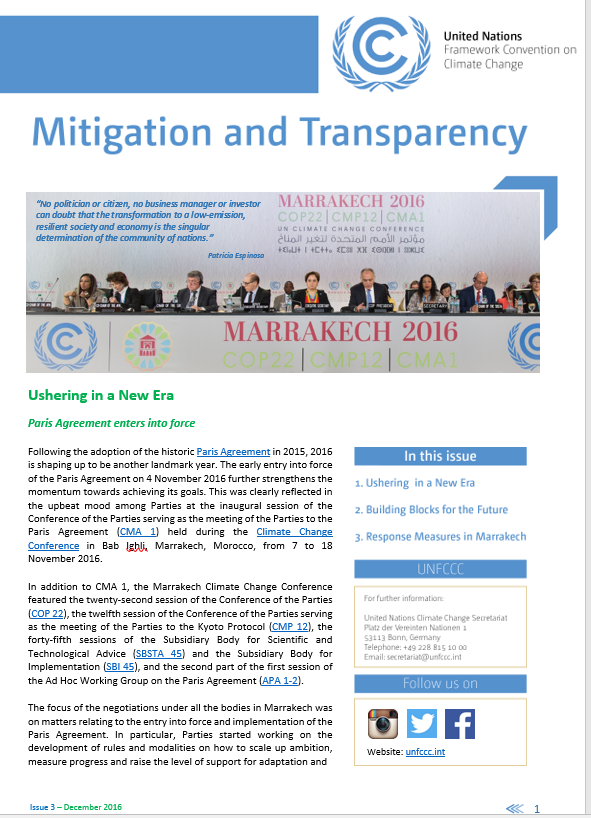COP23
Information
Hub
KEY STEPS
NEGOTIATIONS
FOCUS
PROCESS
|
|
National Reports
|
|
|

Parties to the Convention must submit national reports on implementation of the Convention to
the Conference of the Parties (COP). The required contents of national reports and the timetable for
their submission are different for Annex I and non-Annex I Parties. This is in accordance with the
principle of "common but differentiated responsibilities" enshrined in the Convention.
|
Annex I National Reports
|
|
National Communications (NCs) and Biennial Reports
(BRs)
|
NCs from Annex I Parties provide information on emissions and removals of
greenhouse gases (GHGs); national circumstances; policies and measures; vulnerability
assessment; financial resources and transfer of technology; education, training, and public
awareness; and any other details of the activities a Party has undertaken to implement the
Convention. Annex I Parties that have ratified the Kyoto Protocol must include
supplementary information in their national communications and their annual inventories of
emissions and removals of GHGs to demonstrate compliance with the Kyoto Protocol's
commitments.
BRs outline Annex I Parties' progress in achieving emission reductions
and the provision of financial, technology, and capacity-building support to non-Annex I
Parties.
|
|
Submitted Annex I GHG Inventories
|
Annex I Parties provide annual national GHG inventories covering emissions and removals of
direct GHGs from the Energy, Industrial processes, Solvents, Agriculture, LULUCF, and Waste
sectors, and for all years from the base year or period to the most recent year. These Parties
are required to submit information on their national inventories annually by 15 April.
|
|
International Assessment and Review
|
|
|
Non-Annex I National Reports
|
|
Submitted national communications (NCs)
|
NCs from developing countries provide information on greenhouse gas (GHG) inventories, measures
to mitigate and to facilitate adequate adaptation to climate change, and any other information
that the Party considers relevant to the achievement of the objective of the Convention.
Developing country Parties are required to submit their first NC within three years of entering
the Convention, and every four years thereafter.
|
|
Submitted Biennial Update Reports (BURs)
|
BURs provide an update of the information presented in NCs, in particular on national GHG
inventories, mitigation actions, constraints and gaps, including support needed and
received.
The first BUR should be, consistent with the Party's capabilities or level of support
provided, submitted by December 2014, and every two years thereafter. Least developed country
Parties and small island developing States may submit BURs at their own discretion.
|
|
Submitted national adaptation programme of actions
(NAPAs)
|
NAPAs provide a process for least developed countries (LDCs) to identify priority activities
responding to their urgent and immediate needs with regard to adaptation to climate change.
|
|
Accounting, Reporting, and Review for Annex I Parties
|
Measuring, Reporting, and Verification (MRV) for non-Annex
Parties
|
|
|
|
Summary
|
|
|
|
The importance of reliable data
Accurate, consistent and internationally comparable data on GHG emissions is essential for
the international community to take the most appropriate action to mitigate climate change,
and ultimately to achieve the objective of the Convention. Communicating relevant information
on the most effective ways to reduce emissions and adapt to the adverse effects of climate
change also contributes towards global sustainable development.
Ensuring quality of reporting
Since 1994, governments have invested significant time and resources in the preparation,
collection and validation of data on GHG emissions and the COP has made determined efforts to
improve the quality and consistency of the data, which are ensured by established guidelines
for reporting. Non-Annex I Parties receive financial and technical assistance in preparing
their national communications and biennial update reports, facilitated by the UNFCCC
secretariat.
Each national report submitted by an Annex I Party is subject to an "in-depth"
review conducted by an international team of experts and coordinated by the
secretariat.
BURs for non-Annex I Parties undergo an international verification process through an
international consultation and analysis.
Submission of reports
Parties submit their national reports to the UNFCCC secretariat in Bonn, Germany, which makes
them publicly available. Following a request from the COP, the secretariat synthesizes the
most important information from submitted national communications in separate reports for
Annex I and non-Annex I Parties, and in turn submits these reports to the Subsidiary Bodies
and the COP for consideration.
The UNFCCC secretariat also collects and makes publicly available the annual GHG inventory
submissions of Annex I Parties. It also publishes its own reports summarizing the status and
trends of GHG emissions in Annex I Parties.
|
|
|
|
|
|
|
All latest National Communications
|
|
Read the latest National Communication under the Convention
Annex
I - Non-Annex I

|
|
|
|
Newsletter
December 2016
|

|
|
|
|
|
| |
|